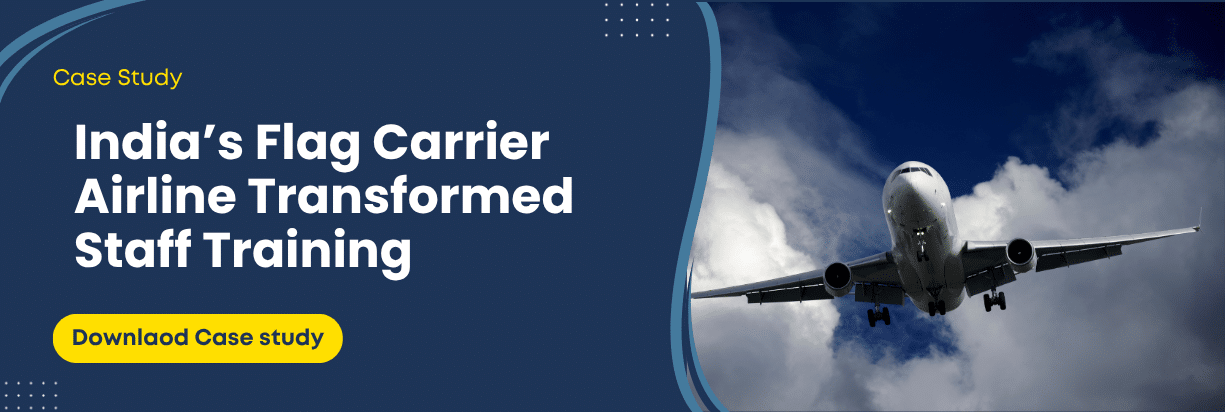The aviation industry has always been at the forefront of adopting cutting-edge technology. As airlines expand globally, the need for efficient, effective, and scalable staff training becomes crucial. Airline staff, from flight attendants to ground crew, require continuous training to stay up-to-date with safety protocols, customer service standards, and operational procedures.
To meet this need, many airlines are turning to Artificial Intelligence (AI) and Learning Management Systems (LMS) to revolutionize their training programs. One such example is how Paradiso LMS transformed staff training for India’s flag carrier airline, streamlining operations and improving overall performance.
The Challenges of Traditional Airline Staff Training
Training airline staff traditionally involves time-consuming, resource-intensive methods. Airlines often rely on in-person training sessions, printed materials, and classroom instruction, which can be inefficient and costly. Additionally, with global operations and a diverse workforce, maintaining consistency in training across different regions becomes a significant challenge.
- Time-Consuming: In-person training can take up valuable work hours, reducing productivity and incurring additional costs.
- Inconsistent Training: With staff spread across multiple locations, delivering uniform training is difficult.
- Limited Scalability: Expanding training programs to accommodate growing teams often leads to logistical challenges and resource constraints.
- Compliance and Safety: Airlines must constantly update staff training to ensure compliance with safety regulations and industry standards, which requires frequent and fast updates.
The Role of AI and LMS Solutions in Airline Staff Training
The integration of AI and LMS platforms addresses many of the challenges faced by airlines in training their staff. By leveraging AI-powered solutions and LMS platforms like Paradiso LMS, airlines can enhance the training experience, ensuring it is engaging, scalable, and tailored to meet specific organizational needs.
1. Personalized Training Paths with AI
AI enables the creation of personalized learning experiences for each staff member, tailoring training based on individual performance, skills, and progress. For example, AI can analyze learner data to identify areas where staff may need additional support, delivering targeted content to bridge skill gaps. This leads to faster and more efficient learning outcomes.
- Personalized Learning: AI analyzes individual performance to offer custom learning paths.
- Adaptive Learning: The system adapts to the learner’s pace, providing real-time feedback and assessments.
- Data-Driven Insights: AI tracks progress, offering data-driven insights for managers to monitor and support their team’s development.
2. Streamlined and Scalable Training with LMS
Learning Management Systems (LMS) provide a centralized platform for managing training content, tracking progress, and engaging learners. With Paradiso LMS, airlines can scale their training programs across multiple locations without the logistical headaches of in-person training. LMS platforms enable the distribution of training materials globally, providing uniformity and consistency.
- Centralized Learning Hub: LMS consolidates all training resources in one location, making it easy to manage and update content.
- Global Accessibility: Staff from different parts of the world can access the training platform anytime, anywhere.
- Efficient Monitoring: Managers can track learner progress, course completion rates, and performance metrics in real time.
3. Immersive Training with AI-Powered Simulations
AI can also be used to create immersive, interactive simulations for airline staff. For instance, flight attendants can engage in virtual emergency procedures, practice customer interactions, and handle difficult situations in a risk-free environment. These AI-powered simulations provide hands-on experience without the risk, enhancing skills retention and confidence.
- Virtual Simulations: AI creates realistic simulations for emergency scenarios and customer service interactions.
- Real-World Application: Staff can practice procedures and scenarios they would face in real life.
- Increased Engagement: Interactive and immersive training leads to better learner engagement and retention.
Paradiso LMS: A Case Study in Airline Staff Training Transformation
India’s flag carrier airline faced many of the challenges mentioned above when trying to scale their training program. To address these issues, they turned to Paradiso LMS for a tailored solution. Paradiso LMS integrated seamlessly with their existing systems, delivering a unified training experience that was both effective and efficient.
1. Centralized Platform for All Training Needs
With Paradiso LMS, the airline was able to consolidate all training resources—videos, manuals, quizzes, and simulations—into one platform. This centralization ensured that all staff, regardless of location, had access to the same up-to-date training materials, making the training process more consistent and standardized.
2. Scalable and Flexible Training Programs
The airline’s global operations meant that staff training needed to be scalable. Paradiso LMS allowed the airline to easily expand their training programs to accommodate more employees as the company grew, without sacrificing the quality of training.
3. AI-Driven Insights for Continuous Improvement
Paradiso LMS’ AI capabilities provided real-time insights into how staff were performing in their training. This allowed managers to track progress, identify trends, and make data-driven decisions to enhance training strategies. Personalized learning paths and AI-driven feedback also ensured that each staff member received the support they needed to excel.
4. Compliance and Safety Training
Compliance with safety regulations is critical in the airline industry. With Paradiso LMS, the airline was able to quickly update training materials to reflect new industry standards and regulatory changes. This ensured that staff remained up-to-date with the latest protocols and safety guidelines, reducing the risk of errors and improving overall safety.













